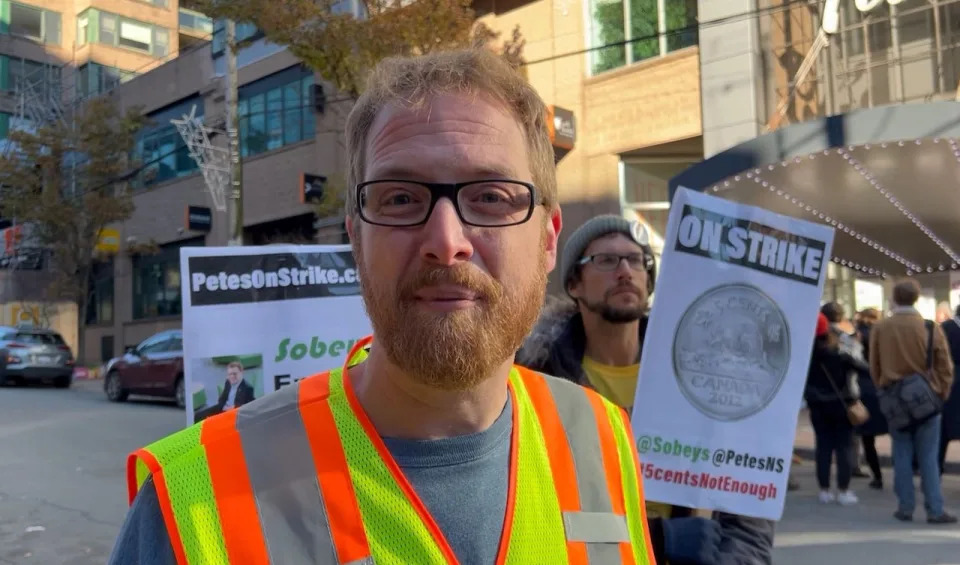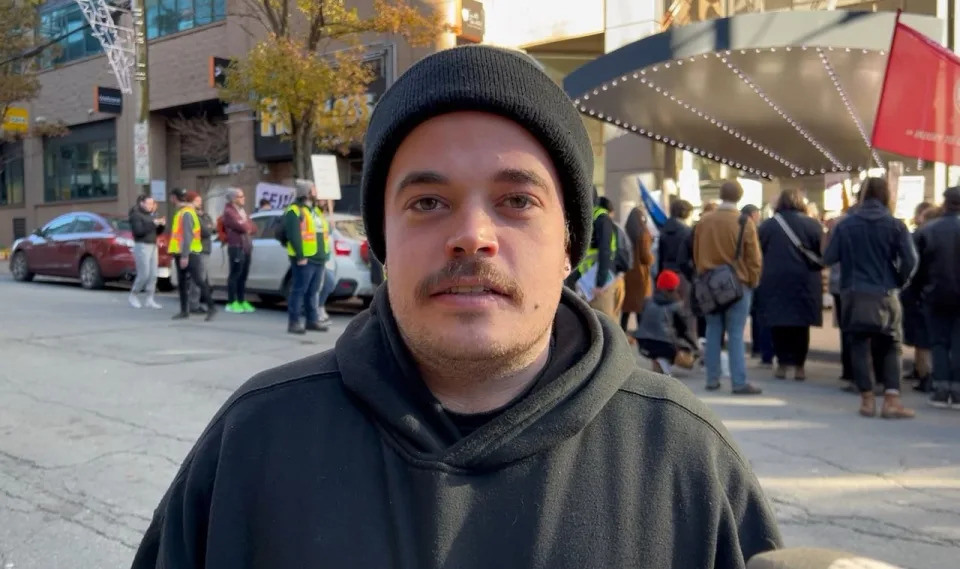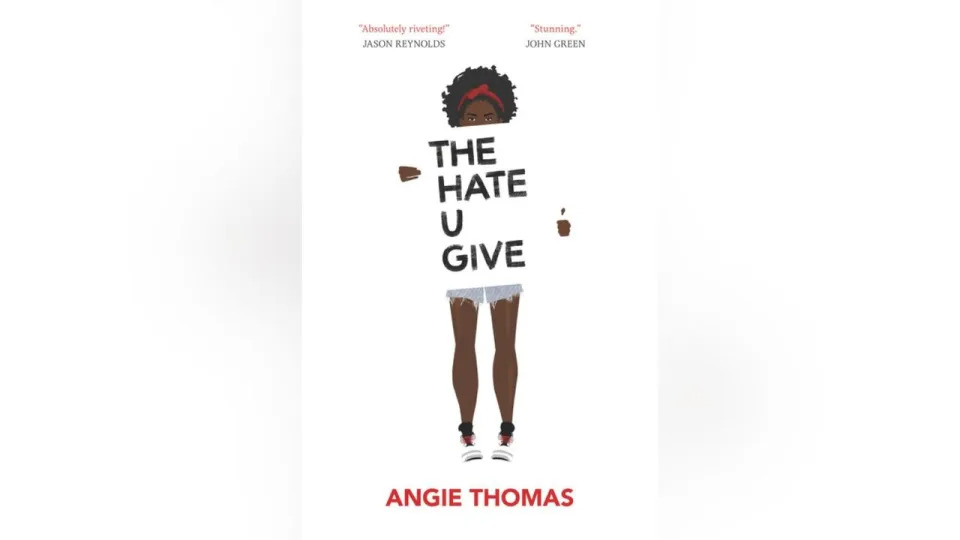ANARCHO-CAPITALI$T
Argentina's new president Javier Milei thinks adopting the US dollar can rescue its screwed economy
Huileng Tan
Mon, November 20, 2023

A Javier Milei supporter at a pre-election rally in Buenos Aires.Tomas Cuesta/Getty Images
Right-wing economist Javier Milei won Argentina's presidential runoff Sunday.
He thinks replacing the peso with the dollar can tame hyperinflation and revive the battered economy.
Milei's supporters say it would tackle triple-digit inflation, but skeptics have their doubts.
Far-right economist Javier Milei's victory in Argentina's presidential runoff on Sunday means the country could abandon the peso — a radical move that would run counter to the country's dedollarization drive.
Provisional results showed Milei garnered nearly 56% of the vote, with most counted.
Milei's been hyping up his desire to dollarize Argentina's beleaguered economy. He argued the move would help tame runaway inflation that hit 143% in October after a slump in the peso that's wiped out 99% of its value against the US dollar this year.
The currency has been depreciating since 2008 due to various reasons including hyperinflation, debt, and political instability.
In October, Milei went as far as saying that the peso "can't be worth excrement."
Prominent economist Steve Hanke — a champion of Milei's dollarization drive — posted on X after the results were announced that the candidate's proposal was "clearly a vote-getter."
Hanke, a professor at Johns Hopkins University, said in August that Argentina should "mothball" its central bank and adopt the greenback as its currency to tame inflation.
However, replacing the peso with the dollar would diminish some of Argentina's autonomy in monetary policy. It would also be the first time an economy as large as Argentina officially adopted the greenback.
Despite its economic woes, Argentina's economy was worth $633 billion in 2022, making it the world's 23rd-largest economy.
Critics of Milei's dollarization plans cite major challenges for Argentina against its backdrop of hyperinflation, economic crises, and political instability.
There's also a fundamental problem with Milei's dollarization plan — Argentina doesn't have enough US dollar assets to finance a major purchase of the currency, wrote Markus Jaeger, a global economy analyst at intelligence firm Stratfor, in October.
In fact, Argentina is so short of US dollars that it used the Chinese yuan to repay part of an International Monetary Fund loan last month.
Coupled with political instability and a history of poor economic management, Argentina would better off reforming its economic regime, wrote Jaeger.
"Full dollarization is the second-best solution to the inflation and economic instability problem," he wrote. "It is also a solution that is fraught with very substantial risks."
The Argentine central bank did not immediately respond to a request for comment from Business Insider, sent outside regular business hours.
Javier Milei: outsider who ignited Argentine rage to become president
By AFP
November 19, 2023

Javier Milei's rants against the country's traditional political parties struck a nerve with voters weary of decades of economic decline and inflation which has hit 143 percent over the past 12 months.
- Copyright AFP/File Patrick T. Fallon
Fran BLANDY
With his wild hair and powered-up chainsaw, the libertarian Javier Milei has upended Argentine politics in a meteoric rise from obscurity to the presidency, riding a wave of fury over decades of economic decline and rampant inflation.
“Long live freedom, damn it!” was his rallying cry throughout a campaign in which he railed against a “thieving and corrupt political class,” notably on TikTok and YouTube where he fired up the youth.
He has vowed to ditch the ailing peso for the US dollar, “dynamite” the central bank, and slash public spending.
His anti-establishment rants, pro-gun stance and abrasive style have seen comparisons drawn between him and former US President Donald Trump and Brazil’s Jair Bolsonaro.
However unlike those two leaders, “Milei came from nowhere… and his popularity came from the disaster of the bad performance of the economy in the last 12 years,” said economist Andres Borenstein, with the Econviews think tank.
While there are those who are fervent supporters, many who backed him were merely expressing disgust with the long-dominant Peronist coalition and its inability to halt Argentina’s cycle of deficit, borrowing, money-printing and inflation.
“They’re not right-wing people, they are angry people and disenchanted people,” Michael Shifter of the Inter-American Dialogue think-tank in Washington said of Milei’s voters.
“This kind of anti-incumbent sentiment has really been everywhere… it’s really just been remarkable that Argentina has managed to avoid it until now,” said Benjamin Gedan, director of the Argentina Project at the Washington-based Wilson Center think-tank.
“What exists now doesn’t work for me,” said Milei supporter Matias Esoukourian, a 19-year-old economics student.
– ‘Anarcho-capitalist’ –
The 53-year-old economist with a rock-star persona blindsided experts when he first emerged as a serious contender by winning an August primary election with 30 percent.
While described alternately as libertarian, far right, or antiestablishment, Milei’s political views are hard to pin down.
He describes himself as an “anarcho-capitalist” who is “above all for freedom.”
He is opposed to abortion and sex education, does not believe humans are responsible for climate change, and thinks human organs should be sold freely.
After he placed second behind his rival Massa in the first-round vote, and allied with the center-right opposition, he toned down much of his more divisive rhetoric.
This includes insulting Pope Francis, a fellow Argentine, and vowing to ditch or privatize key government ministries.
His famed chainsaw — a symbol of cuts he wanted to make to public spending — was nowhere to be seen.
Milei has since said his dollarization program would be incremental, but he insists he will shut the central bank and end the “cancer of inflation.”
Most analysts are stumped as to what he will actually do next, saying most of his proposals are unlikely given his lack of power on Congress, even with his allies.
Political analyst Virginia Oliveros, speaking during an online webinar on the election, said that if Milei won, the transition would be “absolute chaos.”
“He has no team, no plan. It’s not clear what he’s going to do. I think that people are not going to have any patience with him, that the honeymoon is not going to last 15 minutes.”
– Cloned dogs –
Milei was born in Buenos Aires to a middle-class family with whom he admits a “complicated” relationship.
He is very close to his sister Karina, however.
The libertarian’s rock-star persona is no pose — he played in a Rolling Stones cover band in his youth and was also a keen footballer.
Milei began appearing on television shows in 2015, where his red-faced rants against the government gained traction on social media.
His party Libertad Avanza was only formed before 2021 elections when he became a lawmaker for Buenos Aires.
Unmarried and childless, he is known for his love of dogs, and owns four large mastiffs named after liberal economists. He has recently been dating actress and comedian Fatima Florez.
According to “Madman,” the unauthorized biography from journalist Juan Luis Gonzalez, Milei never accepted the death of his first dog, Conan, and all his other pooches are clones he had made in the United States.
When asked about being dubbed crazy, he says: “The difference between a genius and a madman is success.”
Far-right candidate Javier Milei wins Argentina election
Sarah K. Burris
November 19, 2023

Far-right presidential candidate Javier Milei speaks while celebrating the results of the primary elections in Buenos Aires, Argentina on August 13, 2023. (Photo: Alejandro Pagni/AFP via Getty Images)
The man some called the Argentine Donald Trump has won Argentina's top post.
Sunday evening, Javier Milei was declared the winner of the presidency in the country that has experienced significant inflation after the global pandemic. Despite this, Milei promised to kill government services, including healthcare, transportation and eliminate subsidies for utility bills, like gas, electricity and water. He intends to ban abortion and will refuse to take any action around climate change.
In the past, the country has given funds to poor provinces in the country. Milei intends to cut those as well.
The austerity measures are so significant that one NPR report suggested that the markets could crash in the country as a result of the election. After winning the primary, the country saw a slide, but not a crash.
Donald Trump championed the win, posting on social media: "Congratulations to Javier Milei on a great race for President of Argentina. The whole world was watching! I am very proud of you. You will turn your Country around and truly Make Argentina Great Again!"

He followed it with a screen capture of a tweet showing the far-right libertarian standing behind a U.S. Gadsden flag
Javier Milei, right-wing pundit with a passion for Judaism, is elected president of Argentina
He has said he has considered converting to Judaism but worries about how Shabbat observance would clash with the duties of the presidency

Javier Milei speaks during his campaign’s closing rally in Cordoba, Argentina, Nov. 16, 2023. November 19, 2023
BUENOS AIRES (JTA) — Javier Milei, a colorful right-wing populist who has said he would like to convert to Judaism, was elected president of Argentina on Sunday.
Early results showed he garnered over 55% of the national vote, defeating Sergio Massa, the current left-wing government’s economy minister.
Milei’s passionate love of Judaism and Israel has been one of the several unexpected qualities that Argentines and political analysts have become accustomed to during his rapid rise over the past year. Milei, 53, throughout his campaign blamed the outgoing government for soaring inflation and poverty rates. That government included Cristina Fernández de Kirchner — who has been accused of obstructing the investigation into the 1994 AMIA Jewish center bombing — as vice president.
“Today we will start the rebuilding of Argentina,” Milei said in his acceptance speech Sunday night.
Milei, an economist and former TV and radio pundit, calls himself an anarcho-capitalist. He has promised to close several government ministries, including Argentina’s national bank, a move that would make the country’s currency the American dollar. He calls climate change a hoax and has earned comparisons to Donald Trump.
He also studies Torah regularly.
In an interview with Spain’s El Pais newspaper over the summer, Milei talked about his study with Rabbi Shimon Axel Wahnish, who heads ACILBA, an Argentine-Moroccan Jewish community based in Buenos Aires. Milei said he has considered converting to Judaism but worries about how Shabbat observance would clash with the duties of the presidency.
He demonstrates his passion for Judaism at rallies and public events, often walking out on stage to the sound of a shofar, the ram’s horn blown on Rosh Hashanah. At one rally in August, the shofar sound was accompanied on a screen by a photo of a man wearing a Jewish prayer shawl.
He is also an outspoken supporter of Israel, having stated before the start of Israel’s war on Oct. 7 that he would like to make an early diplomatic trip to Jerusalem and to move Argentina’s embassy to that city. In one of his final public appearances before the election, Milei was seen waving an Israeli flag among a large crowd in Rosario.
This article originally appeared on JTA.org.
Fiery right-wing populist Javier Milei wins Argentina's presidency and promises 'drastic' changes
The Canadian Press
Sun, November 19, 2023

BUENOS AIRES, Argentina (AP) — Populist Javier Milei resoundingly won Argentina's presidential election Sunday, swinging the country to the right following a fiercely polarized campaign in which he promised a dramatic shake-up to the state to deal with soaring inflation and rising poverty.
With 99.4% of votes tallied in the presidential runoff, Milei had 55.7% and Economy Minister Sergio Massa 44.3%, according to Argentina's electoral authority. It is the widest victory margin in a presidential race since the South American country's return to democracy in 1983.
In the streets of Buenos Aires, drivers honked their horns and many took to the streets to celebrate in several neighborhoods. Outside Milei’s party headquarters, a hotel in downtown Buenos Aires, a full-on party kicked off with supporters singing, buying beers from vendors and setting off colored smoke bombs. They waved Argentine flags and the yellow Gadsden flag, emblazoned with the words “Don't Tread On Me,” which Milei's movement has adopted.
Inside, the self-described anarcho-capitalist who has been compared to former U.S. President Donald Trump, delivered his victory speech, saying the “reconstruction of Argentina begins today.”
“Argentina’s situation is critical. The changes our country needs are drastic. There is no room for gradualism, no room for lukewarm measures,” Milei told supporters, who chanted “Liberty, liberty!” and “Let them all leave” in a reference to the country's political class.
Massa of the ruling Peronist party had already conceded defeat, saying Argentines “chose another path.”
“Starting tomorrow ... guaranteeing the political, social and economic functions is the responsibility of the new president. I hope he does,” Massa said.
With a Milei victory, the country will take an abrupt shift rightward and a freshman lawmaker who got his start as a television talking head blasting what he called the “political caste” will assume the presidency.
Inflation has soared above 140% and poverty has worsened while Massa has held his post. Milei has said he would slash the size of the government, dollarize the economy and eliminate the Central Bank as a way to tackle galloping inflation that he blames on successive governments printing money indiscriminately in order to fund public spending. He also espouses several conservative social policies, including an opposition to sex education in schools and abortion, which Argentina’s Congress legalized in 2020.
“This is a triumph that is less due to Milei and his peculiarities and particularities and more to the demand for change,” said Lucas Romero, the head of Synopsis, a local political consulting firm. "What is being expressed at the polls is the weariness, the fatigue, the protest vote of the majority of Argentines.”
Massa's campaign cautioned Argentines that his libertarian opponent's plan to eliminate key ministries and otherwise sharply curtail the state would threaten public services, including health and education, and welfare programs many rely on. Massa also drew attention to his opponent's often aggressive rhetoric and openly questioned his mental acuity; ahead of the first round, Milei sometimes carried a revving chainsaw at rallies.
“There were lot of voters that weren’t convinced to vote Milei, who would vote no or blank. But come the day of the vote, they voted for Milei because they’re all pissed off,” Andrei Roman, CEO of Brazil-based pollster Atlas Intel, said by phone. “Everyone talked about the fear of Milei winning. I think this was a fear of Massa winning and economy continuing the way it is, inflation and all that.”
Milei accused Massa and his allies of running a “campaign of fear” and he walked back some of his most controversial proposals, such as loosening gun control. In his final campaign ad, Milei looks at the camera and assures voters he has no plans to privatize education or health care.
Milei’s screeds resonated widely with Argentines angered by their struggle to make ends meet, particularly young men.
“Incredibly happy, ecstatic, it’s a global historical phenomenon!” Luca Rodríguez, a 20-year-old law student, said outside Milei’s headquarters after spraying a bottle of champagne into the air onto those around him, who squealed with glee. “I want to break free from this ridiculous elite that takes away all our rights, all the tax money that pressures us and doesn’t let us live in peace.”
Two Milei supporters in the raucous crowd were 32-year-old identical twins, both dressed in matching grey tank tops with Argentine flags draped over their shoulders.
“We want a change, we want everything to improve,” Amilcar Rollo said beside his brother, Gabriel. “It’s the hope for something new from someone who hasn’t been there and has different ideas. Otherwise, it’s just the same as always.”
Most pre-election polls, which have been notoriously wrong at every step of this year’s campaign, showed a statistical tie between the two candidates or Milei slightly ahead.
Underscoring the bitter division this campaign has brought to the fore, Milei received both jeers and cheers on Friday night at the legendary Colón Theater in Buenos Aires.
The acrimony was also evident Sunday when Milei's running mate, Victoria Villaruel, went to vote and was met by protesters angry at her claims that the number of victims from Argentina's bloody 1976-1983 military dictatorship is far below what human rights organizations have long claimed, among other controversial positions.
The vote took place amid Milei’s allegations of possible electoral fraud, reminiscent of those from Trump and former far-right Brazilian President Jair Bolsonaro. Without providing evidence, Milei claimed that the first round of the presidential election was plagued by irregularities that affected the result. Experts say such irregularities cannot swing an election, and that his assertions were partly aimed at firing up his base and motivating his supporters to become monitors of voting stations. Many have expressed concerns they undermine democratic norms.
Both Bolsonaro and Trump congratulated Milei on social media.
“The whole world was watching! I am very proud of you,” Trump wrote on his platform, Truth Social. “You will turn your Country around and truly Make Argentina Great Again!”
And posting on on X, formerly Twitter, White House national security advisor Jake Sullivan also commended Milei, as well as Argentina for holding free and fair elections.
“We look forward to building on our strong bilateral relationship based on our shared commitment to human rights, democratic values, & transparency,” Sullivan wrote.
Daniel Politi And David Biller, The Associated Press
Milei's dilemma: how to solve a problem like Argentina?
Agence France-Presse
November 20, 2023

Argentina's president-elect Javier Milei surged to power on a wave of anger over decades of economic mismanagement, vowing to ditch the peso for the US dollar, shut down the central bank and slash spending (Luis ROBAYO)
Argentina's president-elect Javier Milei will have no time to bask in his Sunday victory as he inherits a country crippled by inflation and short on cash, creditors and international sympathy.
"Being president of Argentina has got to be one of the worst jobs in politics in the world," said Benjamin Gedan, director of the Argentina Project at the Washington-based Wilson Center.
"The problems have become so deep and complex and intertwined that they're not easily solvable, even if they're easily identifiable."
Milei surged to power on a wave of anger over decades of economic mismanagement, vowing to ditch the peso for the US dollar, shut down the central bank and slash spending.
He has promised "the end of Argentina's decline" and warned there is no time for "gradualism... or half-measures."
He will take office on December 10, and analysts predict a rocky ride with inflation at 143 percent and poverty levels of over 40 percent.
- How and when will he dollarize the economy? -
Milei has proposed the dollarization of the economy by 2025 to halt the "cancer of inflation", meaning he would drop the peso and Argentina would lose control over monetary policy such as setting interest rates.
Dollarization requires a hefty stock of greenbacks, and the International Monetary Fund (IMF) has warned Argentina's dollar reserves are dangerously low.
Even with the backing of the center-right opposition, political newcomer Milei has "very little legislative power," said analyst Carlos Gervasoni of the Torcuato Di Tella University.
"So there is no way to pass laws that, for example, require changing the country's currency or closing the central bank."
- What will happen with the peso? -
To try and keep a lid on inflation, the Argentine government has for years strictly controlled the exchange rate of the peso to the dollar, which was frozen for three months before the election and is now being allowed to devalue at three percent per month.
The exchange rate is "a total fiction. And to maintain it is extremely expensive. Argentina just has literally no money. It can't continue doing this," said Nicolas Saldias, a senior analyst with the Economist Intelligence Unit.
Between now and when Milei takes office, "things could rapidly scale out of control in those weeks. That's a period of a lot of instability," said political analyst Ana Iparraguirre of GBAO Strategies.
Saldias said people may panic believing dollarization is imminent, sparking a run on the peso.
Economy Minister Sergio Massa, whom Milei beat in Sunday's polls, may also implement a long overdue devaluation of the peso, making Milei "pay the political price."
"You'll probably see inflation ramp up very quickly," said Saldias, warning of possible hyperinflation.
- Will Milei take a chainsaw to state spending? -
Milei often appeared on stage at rallies with a chainsaw, vowing to slash public spending by 15 percent, privatize state companies and reduce subsidies on fuel, transport and electricity.
Such belt tightening has long been demanded by the IMF, which has bailed out Argentina 22 times, most recently with a loan of $44 billion dollars in 2018.
But Milei will face the same challenges as predecessors who have tried to get out of a vicious cycle of budget deficits, debt, money printing and inflation.
Untangling the country's economy is tricky. Removing subsidies or slashing welfare payouts would only further worsen poverty, and floating the currency would make imports much more expensive.
"At this point everything you fix worsens a second problem," Gedan said.
"The pain will be acute and spread widely if there is a serious stabilization program and it's not clear that Argentines will see the upside."
There is also the danger of protests and social unrest, especially given that almost half the country did not want Milei in power.
- Is there any good news? -
Gedan said that if Milei and his allies in the opposition do manage to curtail spending and reduce welfare and subsidies while protecting the most vulnerable, "this could be a turning point for the good."
There are other positives on the horizon.
After Argentina's worst drought in a century, which saw agricultural exports plummet in the past two years leading to a $20 billion shortfall in revenue, the country is expecting a bumper harvest in 2024.
Milei will also benefit from an estimated $10 billion in annual savings in energy imports as a new gas pipeline ramps up production from southern Vaca Muerta -- a massive oil and gas reserve -- estimates economist Elizabeth Bacigalupo of the Abeceb firm.
Argentina’s Crossroads Election Reminds Us to Never Underestimate the Far Right
Argentina goes to the polls today to decide between the centrist candidate Sergio Massa and far-right libertarian Javier Milei. The stakes could not be higher.

The far-right Argentine presidential candidate Javier Milei threatens to take a chainsaw to the state budget during a rally on September 25, 2023, in Buenos Aires, Argentina.
(Tomas Cuesta / Getty Images)
BYMARTÍN MOSQUERA
11.19.2023
JACOBIN
Argentines and the world were shocked when far-right libertarian Javier Milei swept the August 13 primary elections, seemingly guaranteeing victory in the general election taking place on Sunday, October 22. However, in a further twist, the candidate for the governing Peronist coalition, Sergio Massa, ended up squeaking out a narrow victory over Milei, setting up a nail-biter runoff election on Sunday, November 19.
Massa’s win in the general election may have tempered some of the more pessimistic forecasts of a far-right takeover in Argentina; however, the fact remains that a free-market paleolibertarian is still a narrow favorite in most polling. There needs to be, in other words, a more honest reflection on the rise of the far right in a society long regarded as inoculated against just this kind of reactionary turn.
Historically, the Argentine far right has been excluded from the halls of power. Until months ago, Milei’s Avanza Libertad (Freedom Advances) was a virtually nonexistent political force with no party structure, provincial candidates, senators, or governors. Pointedly, Argentina’s electoral system was designed to prevent the entry of just these kinds of outsider forces.
Thus, the Argentine political class underestimated the tectonic shifts taking place in society and failed to track their political repercussions. Understanding the eruption of a vigorous far right amid Argentina’s social democratic consensus requires going below the surface.
Upon deeper inspection, Milei’s ascent is clearly related to what is truly the bellwether event of this political juncture: the once-in-a-lifetime crisis of Peronism, the big-tent, populist formation around which the Argentine political system has been orbiting since 1945.
Some will argue that Peronism was resuscitated with Massa’s victory; others will claim that only a candidate as bizarre as Milei — whose mental health has come into question in recent weeks — could give the wildly unpopular minister of economy a fighting chance, thus undercutting the idea of a far-right threat. The truth, however, is that both phenomena — Peronist collapse and the rise of the far right — are very real and deeply interrelated.
An Earthquake Hits Peronism
The Peronists are unlike any other political party. Peronism’s presence in all spheres and levels of social life, its proximity to state structures, its on-the-ground influence through party militants and patronage networks, and its close link with labor and social movements make it a political force whose resiliency invites few modern-day comparisons.
Between 1946 and 1983, Peronism never lost a competitive election (it was, however, banned for decades). In presidential elections, its electoral floor always hovered around 40 percent of the vote. Peronism’s worst result was in 2015, when it reached 38 percent — and that was because a competing Peronist candidate won 14 percent.
By contrast, on August 13, Peronism went to the polls completely unified and saw its vote share reduced to 27 percent. Now, for the first time, Peronism is on the verge of losing its majority in the Senate and is ceding control of governorships in provinces historically considered Peronist strongholds (Santa Cruz, San Juan, and Chaco are notable examples).The Peronists are unlike any other political party.
Since the restoration of democratic rule, Argentina has been rocked by several major capitalist crises (in 1989, 2001, and 2019). Each time, Peronism emerged as the “party of order,” the one force capable of providing the social ballast to keep the state from collapsing and restore governability. In that same sense, the current crisis of Peronism is very much a crisis of the Argentine state itself.
However, the tremors of the current political earthquake have been felt beyond the Peronist camp. Amid massive discontent with the incumbent Peronist government, the traditional right wing had until recently considered itself the heir apparent to the Casa Rosada. Now, with the appearance of Milei, the conservative coalition Juntos for el Cambio (Together for Change) is staring down the possibility of its own collapse.
Patricia Bullrich emerged as the winner of the Juntos primary. Were it not for the appearance of Milei, it would have been Bullrich — the most openly reactionary Juntos candidate — who would have attracted all the attention: for the first time since Argentina’s democratic restoration, a mainstream party was putting forward an openly ultra-right-wing candidate to compete in the general election.
Nevertheless, Juntos por el Cambio has experienced an electoral setback even worse than in 2019, when former president and Juntos leader Mauricio Macri was roundly denied a second term. The traditional Argentine right wing, once confident of returning to power, is now closer to extinction after losing the general election to Milei by a substantial margin.
The Economy and Its Discontents
As the Argentine economy continues to stagnate and inflation hovers at around 140 percent, the rise of the extreme right raises the possibility of the kind of neoliberal shock therapy that the social opposition has kept at bay. What is at stake, in the figure of Milei, is an attempt to smash the resistance that has kept Argentina from backsliding into the austerity politics of earlier decades; in other words, Argentina is facing what Antonio Gramsci called “an organic crisis” of the state, in which a political and social stalemate is overcome by economic and extra-economic force.
One explanation of the Argentine situation stands above all others: the long stagnation of Argentine capitalism beginning in 2011, which saw a recession become an open crisis in 2018. Through inflation, the purchasing power of wages in Argentina experienced a 25 percent decrease between December 2017 and 2023 — a reduction that was even more dramatic for informal workers. Although the most critical decline was recorded in 2018, during the Macri government, the downward trend continued under Peronism and saw the gap between formal and informal workers widen even further (a difference that became more pronounced with the pandemic).
During that period, Argentina saw a loss of formal private employment and an increase in informal employment. In other words, informal workers saw their purchasing power decline while, at the same time, they comprised a larger share of the overall labor force. This new labor landscape has been especially devastating for Peronism, which has overseen a growing crisis while also hurting its own social base through successive austerity measures. The ongoing deterioration of the working class under the country’s two main political coalitions laid the foundations for growing social unrest that finally turned into a general crisis of legitimacy — in the form of Milei.Peronism has overseen a growing crisis while also hurting its own social base through successive austerity measures.
While devastating, the current economic crisis is anything but unexpected. In fact, it is part of a history of recurring cycles. Argentina’s constant political and economic instability is caused by, among other things, the relative strength of its working class. The strength of organized labor in Argentina has acted as a breakwater against a far-reaching capitalist restructuring that would depress wages and resolve the country’s macroeconomic imbalances.
Argentina’s economic turmoil is also related to the transformations in global production in recent decades. The country’s tendency towards economic and social decline began almost half a century ago with the crisis of the Peronist welfare state. That crisis took place against the backdrop of the internationalization of production and the crisis of postwar national development models.
Since then, Argentine society has experienced historic leaps in poverty and inequality indexes. The country went from a 4 percent poverty rate in the 1970s to 40 percent in recent years, showing a trend of almost uninterrupted social regression with few parallels in the world. Although there would be precipitous drops followed by partial recoveries, at critical junctures the decline in standards of living was answered by massive social upheaval.
The Peronist-affiliated movement of Kirchnerism, named after Néstor and Cristina Fernández de Kirchner, emerged in 2003 as a political response to the economic crisis and subsequent social uprising of 2001. One of the defining features of the present situation is the dismantling of the very formation that emerged to manage the successive crises of the last two decades. Although the political crisis is most acutely affecting Kirchnerism, it is spreading to the broader umbrella of Peronism, with effects that are only just coming into view.
Critically, for the first time in its history, Peronism is tasked with dealing with the country’s crisis from a position of power. That seemingly minor detail is of inestimable importance: the extreme right cannot thrive unless a rupture between the popular classes and their traditional political representation has already taken place. Out of power and commanding the loyalty of large parts of the working class, Peronism has historically played a stabilizing role in mitigating the country’s recurrent tendency towards crises; the current political crisis within and without Peronism, which sees the populist formation in power but adrift from its base, is opening the door to a political crisis of greater magnitude.
A Popular Right-Wing Ideology
Early interpretations of Milei’s electoral success focused on the idea of a “protest vote”: that voters were rejecting the two establishment parties based on their chronic inability to tame inflation and revert stagnation. This does indeed explain part of the “Milei phenomenon”; a substantial electorate has expressed a “fluid” unrest and found in Milei the most effective instrument to make its discontent known.
However, the protest vote is not enough to explain the “Milei phenomenon.” First, the specific forms in which social unrest expresses itself are never completely innocuous. Milei’s fluctuating and heterogeneous electoral base should not obscure the consolidation of a popular right-wing ideology — an ideology that Milei has strengthened by bringing in social sectors ordinarily beyond the reach of the traditional right (some of them ordinarily the constituency of the Kirchnerist center left).
Moreover, the “liquid state” of Milei’s electorate is being shaped by a political process that is very much in motion, as his rise generates retroactive effects on his base. As Ernesto Laclau used to say, the “representative fulfills an active function” over the represented: political leaders are not just the result of public opinion and social relations but also shape and influence them.
But what does Milei represent? Milei’s rise poses some interesting parallels with the global populist reactionary movement while also revealing some important Argentine differences. Crucially, the windmills that he is tilting at are distinct from those of reactionary nationalists in Europe and abroad.
It’s true, on the one hand, that the incumbent Peronist government maintained the orthodox austerity measures of the previous Macri government, while it’s also the case that President Alberto Fernández adopted a socially progressive approach to issues like the legalization of abortion, the promotion of inclusive language, the implementation of job quotas for trans people, among others. In other words, the governing coalition’s apparent “neoliberal progressivism” could have made it the object of the same kind of nativist ire that has taken hold in Europe.
Peronism’s main difference with European social democracy is ideological: paradoxically, Peronism has embraced austerity in the name of the struggle against austerity. This is what Argentine sociologist Pablo Semán means when he refers to Peronism’s “mimicry of the state”: the incumbent government has branded itself a strong interventionist state, but only as an ideological cover for the progressive stagnation of state benefits, papered over by weak “income redistribution” measures and ineffective campaigns for “social justice.”
Thus, the current right-wing backlash in Argentina has taken a stridently anti-statist tone lacking in figures like Donald Trump, Marine Le Pen, and Giogia Meloni. While the latter were at least verbal critics of neoliberal globalism, Javier Milei is a flamboyant anarcho-capitalist who dreams of the complete elimination of the state. The deterioration of living conditions under a government that sells itself as progressive and redistributive has created a space for anti-statist politics to find a new base, crucially among those who depend significantly on state subsidies.The current right-wing backlash in Argentina has taken a stridently anti-statist tone lacking in figures like Donald Trump, Marine Le Pen, and Giogia Meloni.
Combining a rhetoric of redistribution with harsh austerity measures has sown confusion among the Argentine working class. On the one hand, it has led them to forget the source of financial orthodoxy in the Macri years. On the other, it is breeding disenchantment with the values themselves — now seen as hollow or corrupt — normally associated with the Argentine social state: progressive income redistribution, the active role of the state in industry, human rights, and social mobilization.
Milei garnered support across all social classes and age groups. Studies indicate that approximately one-third of his voters are avowedly ultraright; another third are classic free-market-oriented voters, while the remaining third come from the popular sector. It is, in other words, undeniable that there is an electoral base for the extreme right; it is equally true that this base remains fluid and unstable.
This fluid and mostly popular constituency has been the source of some misguided optimism. Resigning themselves to an eventual Milei government, many argue that it is a matter of time before Milei starts to hemorrhage that electoral base as he fails to deliver economic stability. But many things — a stabilization plan, the demoralization of the more combative popular sectors, and the political disaffection of the working class — could lead to an opposite situation closer to what happened with Jair Bolsonaro in Brazil. The former captain lost the 2022 elections in a very close second round but managed to consolidate his own base at the cost of Brazil’s traditional parties.
Worse still, this mindset, which argues that a Milei government will lack political support and crumble under the pressure of popular mobilization, has led certain fractions of the Left to cast a “scratch” or “voto en blanco” in the past. It would be a grave mistake to lodge a protest vote in the current circumstances.
The Bizzaro Right Must Be Taken Seriously
Some of Milei’s more outlandish proposals create a sense of disbelief and even denial: his call to allow the unregulated sale of human organs, to create a market for the buying and selling of minors, to privatize all the country’s streets, etc. Naturally, no one thinks these measures can be implemented. Even his bread-and-butter proposals, like the abandonment of the Argentine peso in favor of the US dollar, are hardly feasible.
But the extravagant proposals paper over another package of measures that are very real. These more closely resemble the policies of ultraliberal finance minister Paulo Guedes in Bolsonaro’s government: fiscal austerity led by the privatization or closure of public companies, the dismissal of state workers, and a large-scale attack on public education and health, among others. Moreover, the extreme right will clearly want to go on the offensive against gender equality and LGTBQ rights (by criminalizing abortion, eliminating sex education, implementing a trans quota, etc.) in a manner similar to Bolsonaro in power.
Such a shock policy will require an authoritarian hardening of state structures: the judicial persecution of social leaders, an endorsement of police violence, unregulated access to and carrying of weapons, the revitalization of the reviled armed forces, an attempt to weaken the influence of trade unions in the workplace and, above all, the fight to undermine the strength of Argentina’s social movements in poorer neighborhoods. In short, if these measures were to be successfully implemented, it would mean a strategic defeat for the working class.
It will also require some durable social base, which, again, some sectors of the Left have put in question. Here, though, it is critical to understand that Milei’s rise is taking place amid an economic crisis that brooks no comparison with those of other countries where the far right came to power. A catastrophic economic crisis can provide the excuse for drastic measures, as history has shown: Argentina’s hyperinflationary spiral of 1989–1991 allowed Carlos Menem to take office with a blank check to restore order by any means necessary. What followed was the fire sale of all the country’s state assets and one of the most savage neoliberal restructurings on historical record. As Perry Anderson once said about such stabilization plans in Latin America, “There is a functional equivalent to the trauma of the military dictatorship, inducing a people through democratic and non-coercive means to accept the most drastic neoliberal policies: hyperinflation.”
The extreme fragility of the Argentine economic situation puts Milei’s rise in a different category from the global wave of ultraright governments. A more fitting parallel would be Peru in the 1980s. There, after a similar decade of stagnation, a hyperinflationary peak arrived in the late 1980s. It was in that context that Alberto Fujimori took office with a marginal political force and with no great social or business support. The economic catastrophe provided him with the legitimacy to apply shock therapy: a stabilization plan, privatization of public companies, and the liberalization of the economy, capped by the closure of Congress. The neoliberal restructuring of Peruvian society and the massive violation of human rights under the Fujimori dictatorship constituted a historic turning point from which the Peruvian working class has still not recovered.The disastrous effects of Milei’s short-term measures could actually be part of an attempt to pave the way for long-term restructuring.
The interlocking dynamics of inflation and authoritarian government have not been given sufficient attention, especially in a country where monthly inflation rates are in the double digits and the net reserves of the central bank are negative. Nor can a large-scale banking crisis be ruled out, especially since Milei seems to be aware of the potential benefits of triggering panic by announcing radical “pro-market” proposals with catastrophic effects in the short term (such as an abrupt end to the country’s system of currency controls, the elimination of export taxes, dollarization, etc.). Milei’s victories have already led to panic in the “markets”: falling bond prices, an increase of the “country risk” status, and the stagnation of stocks. But the disastrous effects of those short-term measures could actually be part of an attempt to pave the way for long-term restructuring.
And the Argentine Left?
For years, Kirchnerism served as the breakwater that kept the Right at bay and maintained the poor in a unified anti-neoliberal bloc. But years of orthodox austerity under Peronism have altered the landscape and confused matters politically. To a certain extent, it is now the Argentine popular classes that are reacting against the austerity of Peronism — albeit in a decidedly confused manner.
The left must do everything it can to keep Milei from coming to power, but it must also prevent the slogan “all against the right” from becoming a disciplinary tactic that ends up justifying the orthodox policies pursued by the traditional political forces. In other words, the Argentine left must prevent the “extreme center” from finding in the extreme right the perfect antagonist that allows it to demobilize radical opposition while holding onto power.
Argentina has witnessed the cohering of a great social movement against the ultraright in the weeks before the election. This could play a fundamental role in changing the outcome of the contest. Indeed, a polarization between a democratic mass movement and the extreme right is key to altering the electoral outcome, particularly because no one is more disempowered than the government itself to sound the alarm “against fascism.” And even if the extreme right were to come to power, it is essential that it do so against a backdrop of broad democratic mobilization, which will be the fulcrum for the social and political battles to come.
Martín Mosquera is editor-in-chief of Revista Jacobin.






















